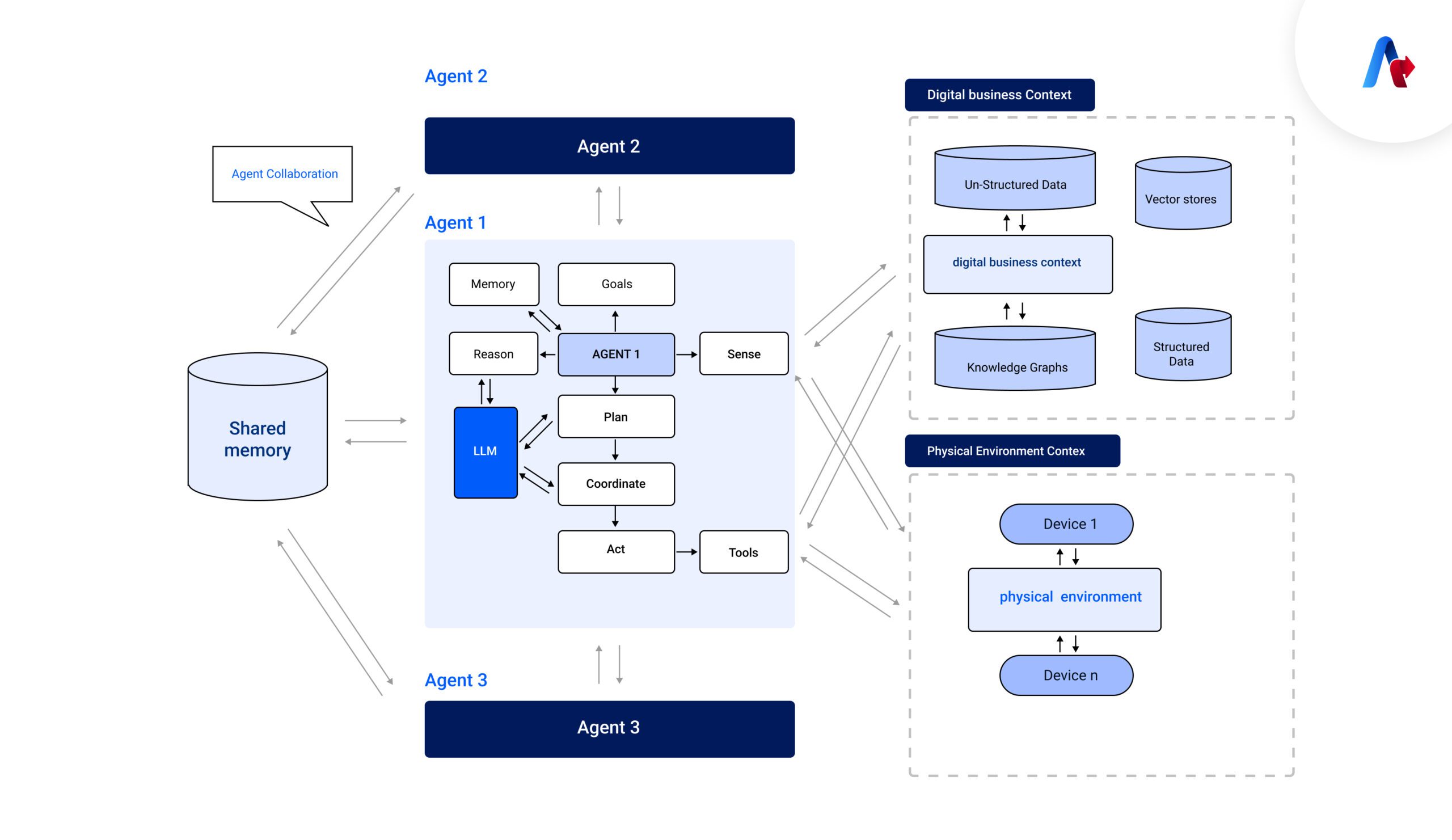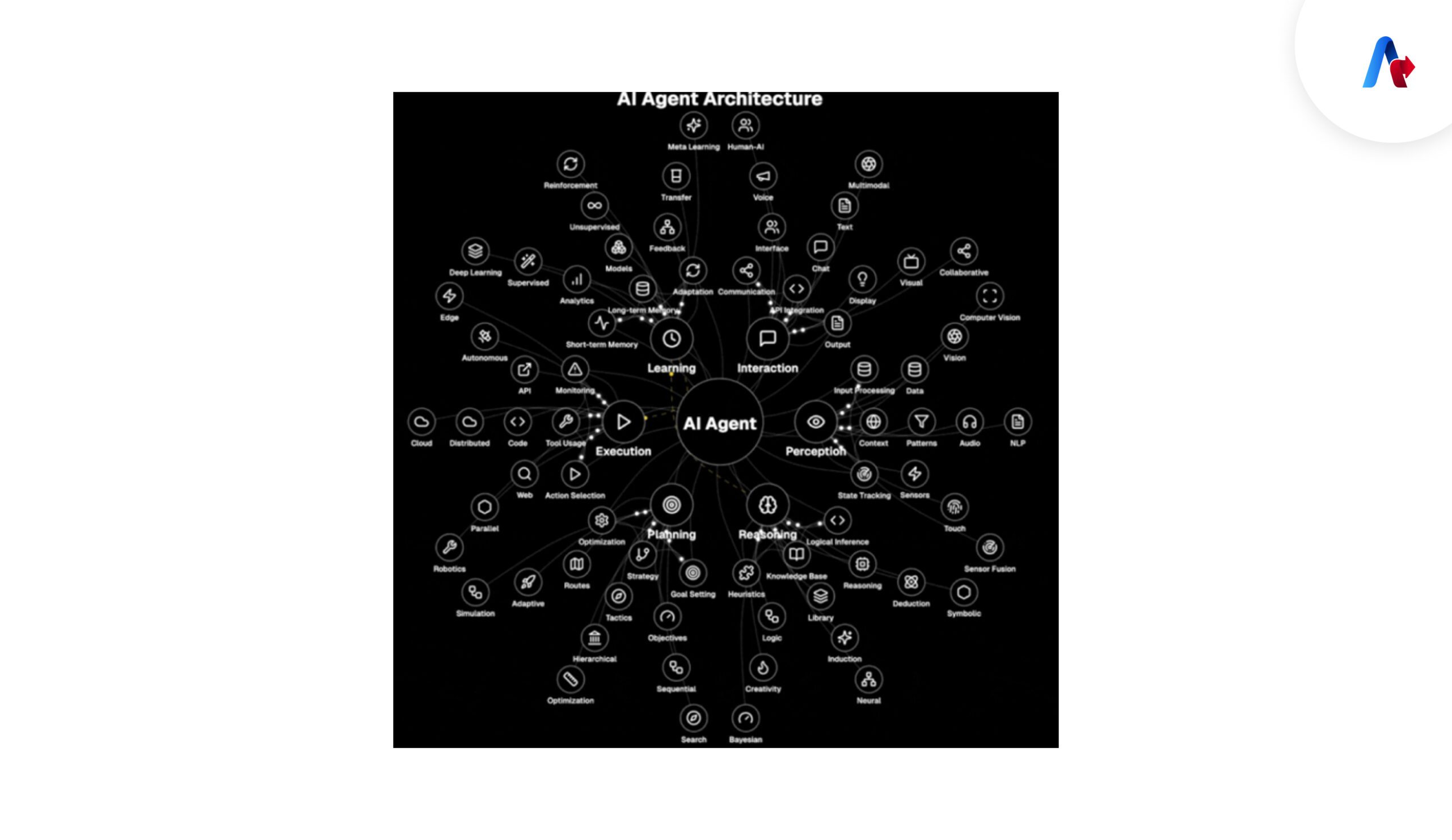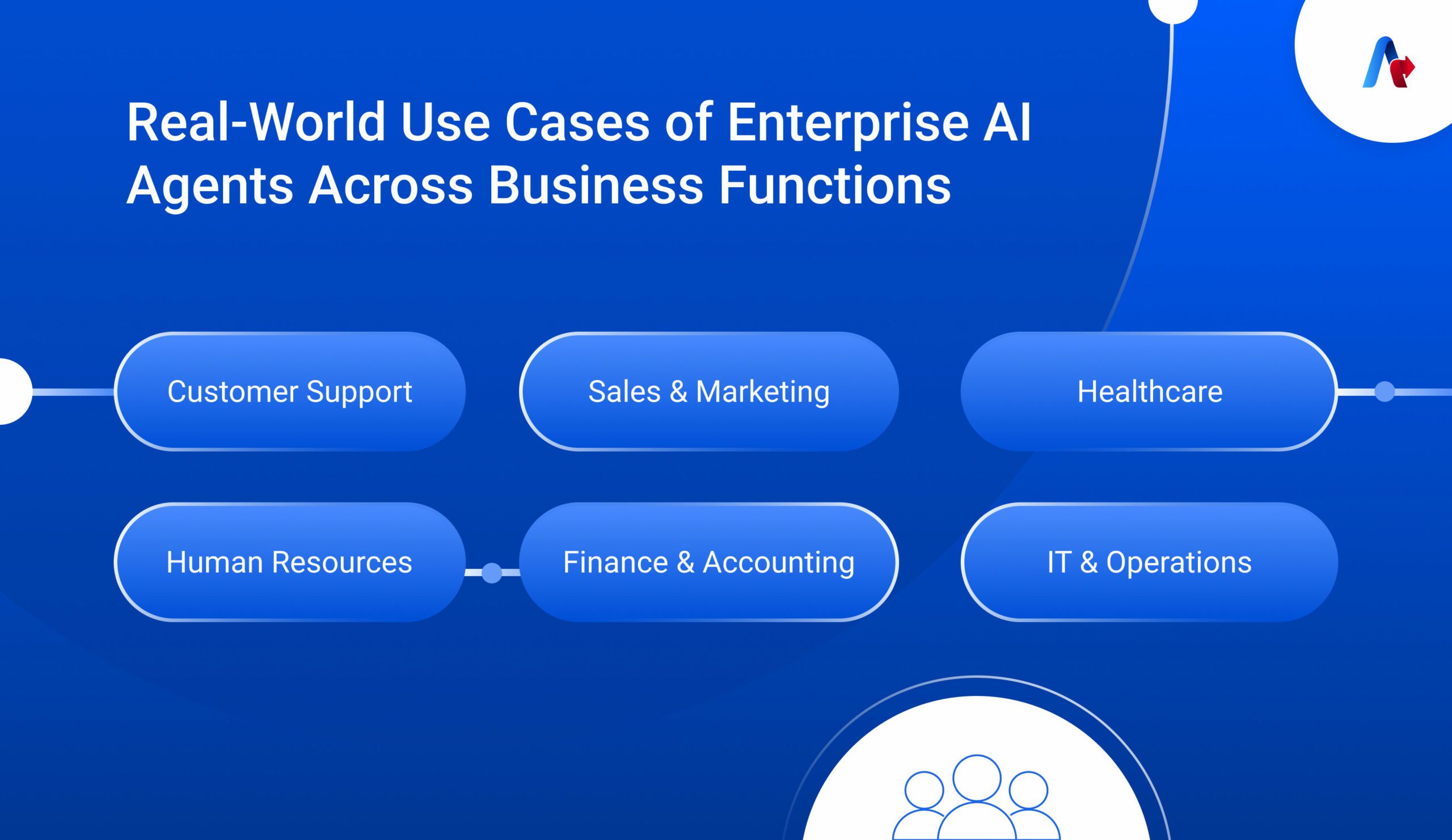Enterprise AI Agents
BLOG
Quick Summary
Enterprise AI agents are intelligent, autonomous systems transforming business operations. These agents enhance productivity, ensure compliance, and deliver tailored experiences, positioning themselves as key drivers of digital transformation.
Artificial intelligence (AI) is currently being quickly adopted by businesses as an important helper of digital transformation. AI is assisting businesses in making quicker, wiser, and more accurate decisions across all functional areas, from improving customer experiences to optimizing operations.
AI agents and autonomous systems can carry out tasks, analyze data, and make context-aware decisions with little to no human intervention; they are largely responsible for this change. By learning over time, adjusting to complex situations, and integrating seamlessly with current enterprise systems, these agents go beyond traditional automation.
Businesses are using AI tools that continuously process real-time data, extract insightful information, and take immediate action in place of manual analysis or static workflows. Better decision-making at scale, lower expenses, and increased efficiency result from this.
In this blog, we will explore the fundamentals of enterprise AI agents, which include their definition, how they operate, and the reasons for their increasing importance to contemporary companies. You will acquire a thorough grasp of how these intelligent systems are changing the enterprise landscape, from the fundamentals of architecture to real-world use cases.
What Are Enterprise AI Agents?
Enterprise AI agents are intelligent software programs that can perform tasks, make decisions, and interact with users or systems without constant human input. They use advanced technologies such as real-time analytics, machine learning, and natural language processing (NLP) to adapt and take action with little human intervention.
Enterprise AI agents are dynamic, context-aware, and have the capacity to learn over time, in contrast to traditional automation tools that follow strict workflows. These agents are able to perform multi-step tasks on a variety of platforms, understand user intent, and understand business rules. They facilitate smooth operations by integrating with enterprise systems like communication tools, CRMs, and ERPs.
An AI agent for customer support, for example, can handle tickets, notify problems, and customize responses without requiring constant human input. By evaluating interactions and taking feedback into account, it gradually increases its accuracy and eventually develops into a dependable, scalable digital workforce.
Because enterprise AI agents follow enterprise-level security and compliance standards while reducing operational overhead, increasing efficiency, and providing quicker decision-making, they are quickly becoming a crucial component of digital transformation strategies.

The diagram above illustrates the cognitive architecture of an enterprise AI agent, highlighting components such as planning, reflection, and user interaction that enable autonomous decision-making within business environments.
What Key Features Make Enterprise AI Agents Unique?
Enterprise AI agents are characterized by their autonomy, adaptability, and seamless integration into existing systems, setting them apart from traditional automation tools.
1. Autonomy with Compliance:
Enterprise AI agents are made to work autonomously, managing assignments and reaching decisions with little assistance from humans. Businesses can scale operations, react to demands more quickly, and reduce the burden of repetitive work thanks to this autonomy.
But being independent doesn't mean doing whatever you want. Business logic, compliance policies, and regulatory frameworks set strict limits on what these agents can do. They follow set rules to make sure that their actions are in line with company policies and the law.
For industries like finance, healthcare, and insurance, where compliance is not an option, this built-in governance is very important. AI agents get reliable results by combining efficiency with accountability. They do this without losing trust or openness.
2. Multi-Channel Integration:
With the help of multi-channel integration, enterprise AI agents can easily interface with other enterprise systems, CRMs, ERPs, and communication platforms. This enables them to function seamlessly within current workflows without requiring manual intervention.
These agents can automate processes like updating records, setting off alerts, or customizing interactions because they have access to real-time data across platforms. A responsive, unified system that increases productivity and guarantees consistent service across all channels is the end result.
3. Context Awareness:
Context awareness enables enterprise AI agents to understand data hierarchies, user roles, and organizational processes. They are better able to make decisions that fit company procedures and policies as a result.
These agents can give more accurate answers, prioritize tasks, and tailor their responses based on the situation. This is true whether they are helping a customer, running operations, or supporting internal teams. This makes automation more useful and makes the user experience better.
4. Scalable:
Scalable enterprise AI agents designed to manage increasing workloads and data volumes without sacrificing accuracy or speed. These agents keep up their effective performance even as business demands rise.
Their scalability guarantees long-term value by enabling businesses to grow, add more users, and handle bigger datasets without having to constantly reconfigure or modify their infrastructure.
5. Continuous Learning:
Continuous Learning lets enterprise AI agents change over time by looking at interactions, user feedback, and results. They don't stay the same; they learn from real-life situations to improve how they do things.
As agents get used to the system, they become more accurate, efficient, and in line with business goals. It also cuts down on the need for constant manual updates by letting the system optimize itself with each new interaction.
These features make AI agents for enterprise not just efficient tools but strategic assets.
Get a personalized demo and discover how they fit into your tech stack.
Talk to our expertsWhy AI Agents Are Becoming Essential for Enterprise Success?
AI agents are becoming very important to modern businesses because they make things run faster, help people make better decisions, and make things more efficient on a larger scale than old systems can handle.
In today's fast-paced business world, companies need to find a balance between being flexible and being accurate. Legacy systems just can't keep up with the need for smart automation and real-time responsiveness that keeps growing. This is where AI agents come in. They are digital helpers that make things run more smoothly and make people less dependent on them for tasks that are repetitive or require a lot of data.
Here’s why they’re becoming essential:
1. Operational Efficiency:
AI agents greatly improve operational efficiency by automating simple, repetitive tasks across departments. These agents do things like processing invoices, routing support tickets, and answering employee questions faster and more accurately than people do.
AI agents take over these time-consuming tasks, which lets workers focus on work that is more strategic, creative, and decision-making. This change not only makes everyone more productive, but it also lowers the chance of human error, which means more reliable results.
This efficiency leads to quicker response times, smoother workflows, and a big drop in operational bottlenecks in fields like finance, HR, and customer service. These changes add up over time, making businesses more flexible and able to grow.
2. Smarter Decisions:
Enterprise AI agents analyze big data in real-time, transforming vast information into actionable insights that empower smarter, faster decision-making.
Businesses create huge amounts of data every second in today's world, which is based on data. Enterprise AI agents use advanced algorithms and machine learning models to quickly process this huge amount of data. These agents find patterns, trends, and strange things in data streams that people might miss or take too long to find by constantly watching them.
This feature lets businesses quickly make smart choices about things like improving customer experiences, optimizing supply chains, spotting fraud, or predicting changes in the market. Real-time insights cut down on guesswork and make businesses more flexible, which helps them stay competitive in markets that change quickly.
For instance, an AI agent that keeps an eye on sales data can quickly let teams know about new customer preferences or low inventory levels. This lets them make changes ahead of time that boost sales and customer satisfaction. This proactive intelligence turns raw data into a powerful tool for making decisions that help businesses grow and come up with new ideas.
3. Improved Customer Service:
Enterprise AI agents change the way customer service works by providing 24/7, personalized help. AI agents are always on and ready to help customers whenever they need it, unlike traditional support channels that are only open during business hours and when people are available.
These agents can understand each customer's needs and wants thanks to natural language processing and machine learning. This lets them have very personalized conversations. AI makes sure that responses are faster and more accurate by answering common questions, helping users fix problems, and sending complicated issues to human agents.
The outcome is happier customers because problems are solved faster and service experiences are more personalized. Enterprise AI agents make businesses more efficient and keep customers coming back by automating simple tasks and letting human agents focus on harder ones.
4. Cost savings:
Enterprise AI agents help businesses save a lot of money by doing tasks that used to need manual work automatically. AI agents take care of everyday tasks like entering data, answering customer questions, and making reports. This frees up people to work on more important things.
This automation cuts down on labor costs, mistakes made by people, and the time it takes to complete tasks, which makes operations run more smoothly. AI agents can also find inefficiencies and make the best use of resources, which lowers operational costs even more.
Using enterprise AI agents makes businesses smarter about how they use their resources, lowers their costs, and boosts their profits. This makes them a great way to keep costs down in today's businesses.
5. Speed and Experimentation:
Enterprise AI agents help businesses respond more quickly to changing market conditions by quickly analyzing data and giving them useful information. This flexibility lets businesses change their plans and operations on the fly, which keeps them ahead of the competition.
Also, AI agents make it easier to try out new ideas by simulating and testing them with little risk and cost. Companies can test out new ideas, marketing campaigns, or process improvements more quickly and effectively by using data-driven feedback to get the best results.
Enterprise AI agents give businesses the power to keep coming up with new ideas and adapt quickly in today's fast-paced world by combining speed with a culture of experimentation.
According to a McKinsey study, product managers utilizing generative AI tools experienced a 5% acceleration in time to market, a 40% increase in productivity, and a 100% improvement in employee experience over a six-month product development cycle.
In a word, they help businesses to work more efficiently using fewer resources.
What Are the Core Components of Enterprise AI Agent Architecture?
Enterprise AI agents are built on key components like Natural Language Understanding, Decision Engines, and Integration Layers that enable intelligent, real-time interactions. These components work together with feedback loops and security modules to ensure accuracy, adaptability, and compliance.
1. Natural Language Understanding (NLU):
Natural Language Understanding (NLU) is what makes it possible for business AI agents to understand spoken and written language. NLU lets the agent understand what people mean by words, find context, and pick up on subtleties like tone, slang, and ambiguity.
This ability is necessary for making interactions between people and machines smooth and natural. If NLU didn't work well, AI agents would have a hard time answering questions correctly or dealing with complicated ones, which would make for a bad user experience.
Advanced NLU models continuously improve by learning from interactions, enabling AI agents to better understand diverse languages, dialects, and industry-specific terminology over time.
2. Decision Engine:
The Decision Engine is the brain of the enterprise AI agent. It looks at the context of user inputs, business rules, and policies to figure out the best response or action. It looks at a number of things, like what the user wants, the data that is available, and past interactions, to make quick and accurate decisions.
The decision engine makes sure that the AI agent's answers are consistent, relevant, and in line with the organization's goals by using both real-time analysis and pre-set rules. This lets the agent deal with complicated situations and set priorities for actions in a smart way.
As the system gets more data and feedback, the decision engine changes and improves its logic all the time, which makes it better at making decisions over time.
3. Knowledge Base:
The Knowledge Base is the main place where the enterprise AI agent gets the information it needs to give accurate and useful answers. It has organized information like policies, procedures, and FAQs, as well as data from past interactions. This large amount of information helps the AI agent give the same answers and solutions every time.
The knowledge base has more than just static data. It also has contextual hints that help the AI understand the bigger picture, like user preferences, past actions, or ongoing workflows. Because the agent is aware of the context, it can tailor its interactions and make more accurate suggestions.
To keep the AI agent up to date, it needs a well-maintained knowledge base. This will help it handle new questions and support changing business needs.
4. Integration Layer:
The agent is integrated with enterprise systems and APIs, the Integration Layer links the enterprise AI agent to different internal systems, databases, and external APIs. This makes it possible for the whole organization to communicate and share data without any problems. This layer lets the AI agent get real-time information, change records, and do tasks that are already part of the company's workflows.
The AI agent can give complete and relevant answers by working with CRM systems, ERP platforms, customer support tools, and other tools. This connection makes sure that the agent's actions are based on the most up-to-date information, which makes interactions more accurate and efficient.
A strong integration layer is necessary for expanding AI capabilities across many business functions. This lets companies use AI agents without having to change their existing technology stack.
5. Monitoring & Feedback Loops:
The Monitoring & Feedback Loops part keeps an eye on how well the enterprise AI agent is doing by measuring important factors like how accurate its responses are, how happy users are, and how often it completes tasks. This monitoring in real time helps find the agent's strengths and weaknesses and shows where they can get better.
User feedback is very important to this process. The AI system learns a lot about its strengths and weaknesses by getting feedback from end users through surveys, ratings, or direct comments. Then, this feedback is used to improve algorithms, add to the knowledge base, and make decisions better.
Monitoring and feedback loops work together to create a cycle of ongoing learning and adaptation. This makes sure that the AI agent gets better at meeting user needs and business goals over time.
6. Security & Compliance Module:
The Security & Compliance Module is an important part that makes sure that enterprise AI agents keep private information safe and follow industry rules. This module has strong security features like data encryption, access controls, and secure authentication to keep information safe from being accessed or breached by people who shouldn't have access to it.
In fields like finance and healthcare, where data privacy is required by law, it is especially important to follow rules like GDPR, HIPAA, and other industry-specific standards. The module makes sure that AI agents handle data properly, keep audit trails, and help with compliance reporting needs.
Companies can safely use AI agents without worrying about exposing data or breaking the law by building security and compliance into the AI architecture. This builds trust with customers and stakeholders.
Together, these pillars help ensure AI agents work predictably, safely, and intelligently in complex enterprise settings.

The image shows key components of an enterprise AI agent’s architecture, including NLU, decision engine, knowledge base, integration layer, feedback loops, and security module—highlighting how they work together to enable intelligent business operations.
Real-World Use Cases of Enterprise AI Agents Across Business Functions

Enterprise AI agents, powered by advanced Agentic automation, are reshaping business functions by automating repetitive processes, improving accuracy, and driving smarter decisions. From IT to healthcare, these intelligent agents help organizations scale efficiently and innovate faster.
Customer Support
AI agents deliver 24/7 support while reducing strain on human teams. They ensure quick resolution and improve user satisfaction through sentiment and context awareness.
Use cases:
- Auto-resolving FAQs and routing complex issues
- Prioritizing tickets based on urgency and sentiment
- Providing multilingual assistance with real-time translation
- Pulling support data from systems like Zendesk and ServiceNow
Sales & Marketing
Enterprise AI agents help personalize outreach, analyze performance, and automate lead management—empowering teams to engage more effectively.
Use cases:
- Qualifying leads using behavioral and demographic data
- Sending tailored messages based on CRM insights
- Real-time campaign performance analysis
- Suggesting upsell and cross-sell opportunities
Human Resources
AI agents streamline HR workflows and enhance employee experience by automating admin tasks and delivering real-time support.
Use cases:
- Automating onboarding, scheduling interviews, and offboarding
- Answering HR queries 24/7 with knowledge base integration
- Screening resumes using role-specific criteria
- Monitoring employee sentiment to improve workplace culture
Finance & Accounting
Finance teams use AI agents to boost efficiency and accuracy in transaction processing and financial forecasting.
Use cases:
- Automating invoice approvals and purchase order matching
- Flagging anomalies for fraud detection
- Coordinating with vendors and tracking payments
- Running budget forecasts using predictive analytics
IT & Operations
IT departments deploy AI agents to maintain system reliability, minimize downtime, and enhance infrastructure efficiency.
Use cases:
- Monitoring and auto-resolving routine IT issues
- Allocating resources based on usage and workload trends
- Generating compliance reports and performing software updates
- Balancing network loads and scaling infrastructure
Healthcare
AI agents in healthcare help improve patient care, operational efficiency, and compliance with regulations by acting on both structured and unstructured data.
Use cases:
- Managing patient appointment scheduling and follow-ups
- Managing patient appointment scheduling and follow-ups
- Assisting in prior authorization processes and claims management
- Monitoring patient feedback to improve service quality
- Ensuring compliance with HIPAA and automating documentation
What Role Will AI Agents Play in the Future Enterprise?
AI agents will evolve from task-based assistants to strategic collaborators—operating autonomously, scaling decision-making, and augmenting human capabilities.
Enterprises will rely on these agents to create smarter, more resilient, and more adaptive organizations.
AI agents are getting better at handling complicated tasks like negotiating contracts by quickly analyzing terms and risks. This helps businesses finish deals more quickly and accurately. They can make better decisions because they can handle large amounts of data, which cuts down on mistakes and speeds up negotiations.
They also keep an eye on supply chains in real time to find weaknesses before they cause problems. AI agents help businesses stay flexible and keep things running smoothly in a fast-paced environment by suggesting practical changes and checking how they affect costs and timelines in real time.
More and more businesses will work in "agentive ecosystems," where many AI agents work together smoothly across departments, functions, and locations. When these agents work together in real time, they share data and insights to make sure that business processes run smoothly and efficiently on a large scale.
These kinds of ecosystems help businesses break down barriers, make decisions faster, and quickly adjust to changes around the world. Organizations can make their operations better, give customers better experiences, and unlock new levels of innovation by using this networked intelligence.
Human workers will increasingly collaborate with AI agents as co-pilots, allowing technology to handle routine and data-intensive tasks while freeing people to focus on creativity, empathy, and strategic decision-making. This partnership enhances productivity by combining the strengths of both humans and machines.
By offloading repetitive work to AI, employees can dedicate more time to innovation, complex problem-solving, and building meaningful relationships with customers and colleagues. This human-AI collaboration fosters a more engaged, agile, and future-ready workforce.
The future is not about automation; the future is augmentation. And companies that make use of AI agents today are building their future sources of sustainable competitive advantage.
Explore AI Solutions for Your Enterprise
Talk to our expertsReady to Transform Your Enterprise with AI?
Enterprise AI agents are transforming how businesses operate, innovate, and compete. As Agentic Automation solutions gain traction, it’s vital to choose the right AI agents, integrate them strategically, and align them with long-term goals. Partnering with experts who can help build and deploy enterprise-ready AI agents ensures success. At Accelirate, we offer tailored Agentic Automation solutions to future-proof your business. Now is the time to embrace AI agents and unlock agility, efficiency, and innovation at a scale.


